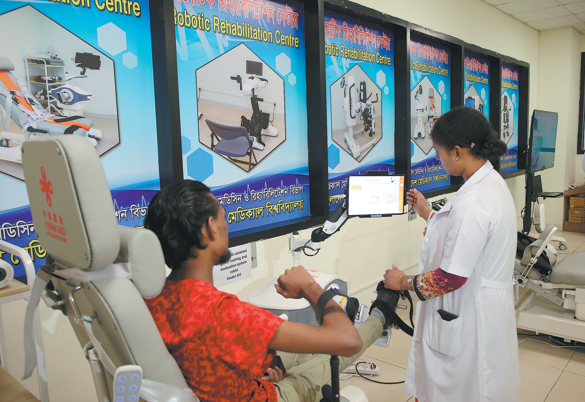
Earlier this year, 23-year-old Jannatul Nayeem boarded a flight from Dhaka, Bangladesh, carrying more than just his luggage — he carried hope.
Struggling with a persistent spinal disc issue, Nayeem had visited multiple clinics without finding relief. His hopes of seeking treatment in India were dashed when his visa application was rejected.
In search of another option, Nayeem turned to Kunming, the capital of China's Yunnan province. At the Kunming Tongren Hospital, doctors quickly diagnosed his condition and performed surgery. "Now he is doing well," his brother, Omar Faruk Rashedin, shared in August.
Similarly, Bangladeshi singer Hyder Husyn, who traveled to Kunming in March, underwent treatment for both heart disease and neck pain.
"China's medical system is good and relatively affordable," Hyder said. "In Dhaka, it would have cost 300,000 to 400,000 Bangladeshi taka ($2,500 to $3,300). But in China, the treatment — including accommodation and food — cost me around $1,000, excluding airfare."
Their journeys reflect a growing trend of Bangladeshis seeking medical care in China.
2025 marks the 50th anniversary of China-Bangladesh diplomatic relations, as well as the year of China-Bangladesh people-to-people exchanges.
Chinese Ambassador to Bangladesh Yao Wen said healthcare cooperation has become a key achievement in the two countries' bilateral ties this year.
"The first Bangladeshi patients traveled in March, and about 600 have since received treatment. We expect 4,000 to 5,000 by year's end," Yao said.
In August, a delegation of Bangladeshi medical experts visited Kunming for knowledge exchange at Kunming Medical University. Delegate Faruk Ahammad, vice-principal of Dhaka Medical College, was impressed by the facilities and management during his five-day training program. He said, "The experience will benefit both my students and patients."
Ahammad suggested introducing Chinese language programs in Bangladesh to ease communication between doctors and patients.
Nurun Nahar Khanam, director of the Institutional Quality Assurance Cell at Bangladesh Medical University, was impressed by Kunming's modern, clean, and rapidly developing medical infrastructure.
"The practices I observed at Kunming Medical University are advanced, and the patient care systems are exemplary," she said.
Md Khaled, consul general of Bangladesh in Kunming, said global collaboration is vital in advancing healthcare systems, particularly for the country.
"Such an exchange program not only contributes to the continued strengthening of the ties between Bangladesh and China, particularly with Yunnan, specifically in the field of healthcare and medical education and training."
Khaled added that this year, the two countries have initiated the flagship cooperation in medical tourism to implement a vision that benefits the two peoples by opening Chinese hospitals for Bangladeshi patients.
As medical tourism gains momentum, Bangladesh is exploring more options for advanced, affordable treatments.
Advanced treatments
Azad Majumder, deputy press secretary to the chief adviser, emphasized Bangladesh's shift from traditional destinations. "We are looking for advanced treatments at affordable prices, delivered in a timely manner," he said.
Kunming has become an active player in medical tourism, aided by its proximity to Southeast Asia — just two and a half hours by air from Bangladesh.
"The location is ideal," said Md Mohsin, joint secretary at Bangladesh's Ministry of Health and Family Welfare, in a speech during the training program in August.
Wang Jiankun, deputy director of the Yunnan Health Commission, said that they have selected hospitals with advanced techniques to provide international healthcare services to Bangladeshi citizens.
To further support the influx of international patients, Yunnan has rolled out several initiatives aimed at streamlining the medical tourism process.
Ambassador Yao confirmed that the embassy now processes medical treatment visas through a "green channel", enabling patients with hospital invitation letters to secure visas within a single working day.
Kunming's hospitals have also increased language support, with professional translators now available to assist both patients and medical staff members.
Plans are also underway for direct flights between Kunming and Chattogram, which are expected to begin by the end of the year. "This will make travel easier for both patients and businesspeople," Majumder added.
"We are building a better future together by opening Chinese hospitals for Bangladeshi patients and expanding medical tourism," said Khaled, consul general of Bangladesh to Kunming.
Contact the writers at houchenchen@chinadaily.com.cn.
Wang Huanran contributed to this story.
微信扫描下方的二维码阅读本文

